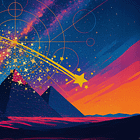When the Sky Spoke First: The Origins of Astrology
Before astrology was a belief, it was a memory system etched into time.
Long before Babylon.
Before Egypt.
Before what we call “history.”
There were those who looked up and noticed.
Today we call it astrology.
But it began as survival.
As sky-watching.
As reverence for the rhythm that ruled everything.
They say astrology began with the Babylonians, who charted the stars and divined omens from planetary movement. And yes - around 4000 years ago, in the fertile crescent of Mesopotamia, the first organized system of celestial signs appeared in writing. Clay tablets. Sky omens. Kings advised by priests who watched the heavens.
But that’s not where it began.
Because the patterns they recorded had already been watched.
Tracked.
Confirmed over centuries.
Some planetary cycles take 200 years or more to repeat.
To even notice that rhythm, let alone name it, would’ve taken generations of dedicated sky observation.
What we now call astrology?
It was built by hundreds of lifetimes staring at the same sky.
The oldest science we have
Before the telescope,
before timekeeping,
before written language -
there was the sky.
It was the first clock.
The first compass.
The first calendar.
Evidence suggests even Paleolithic peoples tracked the Moon’s phases, possibly recording them in notched bones over 30,000 years ago. By 10,000 BCE, sites like Göbekli Tepe were already aligned to solstices and celestial markers. We’re told it’s the earliest known temple.
But Göbekli Tepe doesn’t feel like a beginning.
It feels like a preservation.
Like a memory someone was trying not to lose.
As if they were reconstructing knowledge from somewhere older,
somewhere deeper - perhaps from a time that didn’t survive the flood.
Pattern is ancient. Pattern is power.
To understand astrology, you don’t need to believe in fate.
You need to understand repetition.
The stars rise and fall in precise cycles.
Mars loops back every 2 years.
Jupiter returns to its place every 12.
Saturn takes nearly 30.
Pluto needs 248 years to make one full orbit through the sky.
Imagine the kind of attention it takes to notice that.
To track it.
To confirm it.
And to pass that observation on for ten generations,
until a pattern becomes a principle.
That’s not superstition. That’s cosmic timekeeping.
A science so slow and sacred that most modern minds have forgotten how to see it.
Astrology was never just “belief.”
It was record-keeping.
It was memory.
It was the act of noticing the sky and realizing it was not random.
Early astrologers didn’t separate observation from meaning.
If Venus disappeared, they knew she would return.
If a red star hovered at the edge of the night, they knew the fires would follow.
If a comet split the sky, it wasn’t just beautiful - it was a signal.
Not magic.
Not metaphor.
Just a world that still spoke in symbols - and people who still listened.
So where did astrology begin?
It didn’t begin.
It unfolded - over centuries, over lives, over long and loyal watching.
Passed from stone to sky to scribe.
It is the story of humanity noticing something greater, and choosing not to forget.
And if some of that knowledge came from somewhere older,
Somewhere buried beneath the layers of flood and fire and forgetting,
Well, maybe it’s not our job to prove it.
Maybe it’s our job to remember how to look up again.










And they knew about the 2,000+ year cycle of the precession of the equinoxes without telescopes, etc. Certainly suggests some level of connection or deep-in-the bones way of knowing that we’ve since lost.